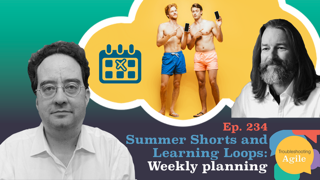This is a transcript of episode 234 of the Troubleshooting Agile podcast with Jeffrey Fredrick and Douglas Squirrel.
Taking iterative development to heart, Squirrel and Jeffrey discuss a learning loop topic, Summer Shorts and Learning Loops: Weekly planning, in five minutes or fewer. Take just a few minutes with us to improve your team’s learning and speed!
Listen to the episode on SoundCloud or Apple Podcasts.
Introduction
Listen to this section at 00:11
Squirrel: Welcome back to Troubleshooting Agile. Hi there, Jeffrey.
Jeffrey: Thanks, Squirrel.
Squirrel: So there are our theme for the summer is learning loops. And Jeffrey, when is a learning loop better.
Jeffrey: When they’re faster?
Squirrel: Exactly. So that’s what we’re going to do this summer is summer shorts. So this week we’re going to talk about a learning loop topic. And Jeffrey, we only have 5 minutes. Do you think we can do it?
Jeffrey: Oh, I think we can.
Squirrel: Great. Then here we go.
Weekly Planning
Listen to this section at 00:43
Squirrel: OK! Weekly planning. Jeffrey, last time we talked about daily planning, what’s weekly planning?
Jeffrey: Weekly planning ia again a common cadence, and something that can apply both individually and at a team level. This is something people are probably most familiar with from Scrum, and if you do a weekly sprint then you’d have the ritual of the weekly planning meeting.
Squirrel: Oh, and you have the grooming, and then you have the preparation for the grooming that actually comes before that, and then you have the pre-preparation grooming. Is that part of it?
Jeffrey: That’s not the part I’m going to focus on, and what you described sounded fairly horrific, which is why this is not about scrum per se, it’s about giving yourself a cadence to check “what are we planning to do this week? What did we expect to get done?” I don’t know why, but for me one week has always been a very natural planning horizon when it comes to software. In fact, I’ve kind of had a rule that the things that we think we can get done in a week, we’re pretty good in our estimates. If it’s a week or less, we’re pretty accurate. Any estimate that’s longer than a week I have found to be entirely unreliable.
Squirrel: You know I had somebody ask me a wonderful question when I was trying to plan for three months at a time, a full quarter, he said, “What are you going to have for dinner three months from now?” And I said, “I have no clue. I don’t know where I’ll be. What do you mean?” And he said, “What are you going to have for dinner next Tuesday?” And I said, “Well, it’s probably either going to be this or that because I know what’s in the kitchen.” It’s the same thing. You have so much more information, you can make such a better prediction.
Jeffrey: That’s right. Weekly planning I’d like to be sharp enough to be falsifiable. What do we actually expect to get done this week that at the end of the week we can know yes or no did we make it? That’s the key here: to be precise enough that you can look back at the week and say, “yep, we did it”, or “no, we didn’t.” That precision really helps with the focus day to day throughout the week because remember, this is what we’re trying to get done! “Are we on track to get it done?” The weekly planning is where you all assess what variables are there this week that matter? “Oh, don’t forget that we have that conference we’re going to on Thursday afternoon.” “Oh, don’t forget this person’s out on Wednesday.” “Oh, I have a dentist appointment.” Let’s factor all that in. “Given what we know, we think this is realistic. This is what we think we can get done as long as we’re focused and disciplined and given what we know tends to happen here.”
Squirrel: Are we aiming for perfection? Are we looking to actually accomplish everything on the list? Hint: no.
Jeffrey: No. These are learning loops, not perfection loops. If it was perfect, then you would stop. “Okay, that was perfect. We’ll probably never do that again.” That’s my experience anyway. You’re always looking to say, “here’s the best estimate we can make given what we know today,” and the gap between what we expected and what we accomplished is where the learning happens, and surprise; sometimes things go better than we anticipated. Things take less time, that’s allowed. And you can say, “Well, that’s great. What happened that allowed us to be faster this week and how can we do more of it next time?” So it’s not just about things going badly, it’s also sometimes things go well and learning from that too.
Squirrel: Wonderful. Thanks, Jeffrey.
Jeffrey: Thanks, Squirrel.

